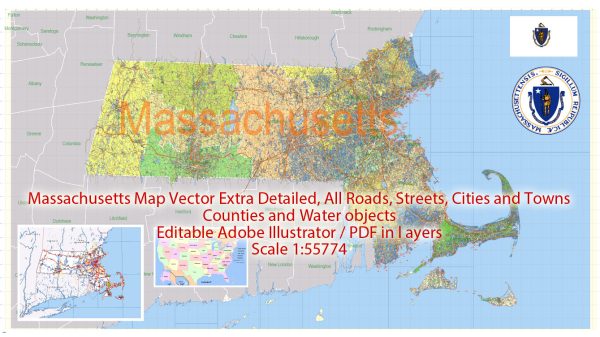Massachusetts is known for its abundant water resources and numerous bridges due to its geographical location and the presence of numerous rivers, lakes, and coastline. Here are some key aspects of Massachusetts’ water resources and bridges:
- Rivers: Massachusetts is home to several significant rivers, including the Connecticut River, Merrimack River, Charles River, and Housatonic River. These rivers play a crucial role in the state’s water resources and transportation systems.
- Lakes and Ponds: Massachusetts has numerous lakes and ponds, with the largest being Quabbin Reservoir, Wachusett Reservoir, and the many ponds in the Cape Cod area. These bodies of water are essential for drinking water supply, recreational activities, and ecological balance.
- Coastline: The state boasts a beautiful coastline along the Atlantic Ocean, with popular coastal regions like Cape Cod, Martha’s Vineyard, and Nantucket. The coastal areas offer abundant fishing, tourism, and support various industries.
- Bridges: Massachusetts has a vast network of bridges due to its numerous waterways. Some notable bridges in the state include the Zakim Bunker Hill Bridge in Boston, the Tobin Bridge, and the Bourne and Sagamore Bridges, which connect Cape Cod to the mainland.
- Infrastructure and Maintenance: The Massachusetts Department of Transportation (MassDOT) is responsible for managing and maintaining the state’s bridges and roadways. They conduct regular inspections to ensure safety and structural integrity.
- Historical Bridges: Massachusetts also has several historic bridges, such as the Old North Bridge in Concord, which played a significant role in the American Revolutionary War, and the Longfellow Bridge connecting Boston and Cambridge.
- Cape Cod Canal: The Cape Cod Canal is a man-made waterway connecting Cape Cod Bay to Buzzards Bay. It has two highway bridges, the Sagamore Bridge and the Bourne Bridge, which are essential for transportation to and from Cape Cod.
- Water Conservation: The state places a strong emphasis on water conservation and environmental protection. The Massachusetts Water Resources Authority (MWRA) is responsible for managing water resources and ensuring a safe and clean water supply for the Greater Boston area.
- Recreational Activities: Massachusetts’ water resources provide opportunities for a wide range of recreational activities, including boating, fishing, swimming, and water sports.
- Environmental Preservation: Many organizations and agencies work to protect and preserve the state’s water resources and natural habitats, including the Massachusetts Division of Ecological Restoration and various watershed associations.
These elements collectively make Massachusetts a state with a rich and diverse water resources and bridge infrastructure that serves its residents and visitors while contributing to the state’s historical and economic significance.


 Author: Kirill Shrayber, Ph.D.
Author: Kirill Shrayber, Ph.D.